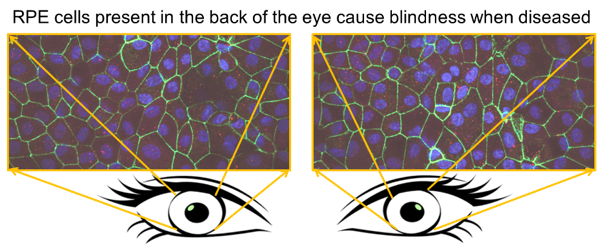Groundbreaking vision research discoveries in the laboratory are essential to advancing therapies for blindness. Dr. Pattnaik is committed to making key discoveries in pediatric blindness conditions that will pave the ground for future therapeutics. Over the years we have made significant progress in our understanding of molecular mechanisms of blindness in children due to either developmental or inherited condition. Our research focus is on cellular communications that are key to life and disease. We discovered a novel cellular signaling pathway between cone photoreceptors and retinal pigment epithelium (RPE) that utilizes oxytocin in the PR and oxytocin receptors in the RPE cells. This established a role for naturally occurring oxytocin signaling in the eye beyond its involvement in labor and sociability.
Another key focus of our laboratory research is channelopathy, defects in ion-channel proteins, leading to inherited and acquired blindness. Ion channels are integrated in the cell membrane and control the passage of specific ions into or out of cells life-long. RPE cells are present in the back of the eye that nourishes neural retina to maintain its health resulting in our ability to see. We have shown that mutations in RPE inwardly rectifying potassium and chloride channels cause blindness such as Leber congenital amaurosis (LCA) and Best’s disease. We are currently employing several in-vitro (patient-derived induced pluripotent stem cells iPSC-RPE) and in-vivo (genetically engineered mouse) models to study cell, tissue, organ, and animal physiology. We use various state of the art techniques like electroretinogram, patch-clamp, biological imaging, molecular and biochemical techniques to repair ion channel defects in the hope to treat blindness.

Recent News & Announcements
OXT-OXTR Pathway Active in Posterior Retina
Oxytocin Expression and Function in the Posterior Retina: A Novel Signaling Pathway
Research News

Shapiro scholars join Department of Pediatrics for summer research experience
This summer, 13 medical students will join Department of Pediatrics faculty mentors for an immersive research training experience through the Shapiro Summer Research Program. The program is designed to educate students about the process of …
June 2, 2025
Bikash Pattnaik receives global fellowship to investigate new therapies for rare inherited blindness
India’s Ministry of Science and Technology recently awarded a VAIshwikBHArtiyaVaigyanik (VAIBHAV) fellowship to Bikash Pattnaik, PhD, associate professor in the Division of Neonatology and Newborn Nursery, leader of the Pattnaik Research Group, and an affiliate …
April 25, 2025
Bikash Pattnaik appointed Retina Research Foundation Daniel M. Albert Chair
Bikash Pattnaik, PhD, associate professor, Division of Neonatology and Newborn Nursery, was named the Retina Research Foundation Daniel M. Albert Chair. The professorship, provided by the McPherson Eye Research Institute, will support Pattnaik’s scholarly activities …
October 3, 2024
Bikash Pattnaik named Silver Fellow of the Association for Research in Vision and Ophthalmology
Bikash Pattnaik, PhD, associate professor, Division of Neonatology and Newborn Nursery, was named a fellow of the Association for Research in Vision and Ophthalmology (ARVO) and a member of the Silver Fellows Class of 2024. ARVO …
December 8, 2023
New gene-editing technique holds potential for treating childhood blindness
Using a new experimental technique to fix faulty eye cells, a team led by UW–Madison researchers was able to repair a gene mutation that causes one form of childhood blindness. The scientists showed that their …
October 12, 2023- More News...

Associate Professor
bikashp@pediatrics.wisc.edu